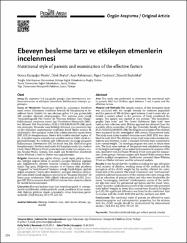| dc.contributor.author | Muslu, Gonca Karayağız | |
| dc.contributor.author | Beytut, Dilek | |
| dc.contributor.author | Kahraman, Ayşe | |
| dc.contributor.author | Yardımcı, Figen | |
| dc.contributor.author | Başbakkal, Didar Zümrüt | |
| dc.date.accessioned | 2020-11-20T17:21:34Z | |
| dc.date.available | 2020-11-20T17:21:34Z | |
| dc.date.issued | 2014 | |
| dc.identifier.issn | 1306-0015 | |
| dc.identifier.issn | 1308-6278 | |
| dc.identifier.uri | https://app.trdizin.gov.tr//makale/TVRZMk5EVTNOdz09 | |
| dc.identifier.uri | https://hdl.handle.net/20.500.12809/7128 | |
| dc.identifier.uri | https://doi.org/10.5152/tpa.2014.1742 | |
| dc.description.abstract | Amaç: Bu araştırma 3-6 yaş grubu çocuğu olan ebeveynlerin bes- leme tarzlarının ve etkileyen etmenlerin belirlenmesi amacıyla ya- pılmıştır. Gereç ve Yöntemler: Tanımlayıcı tipteki bu çalışmanın örneklem sayısı evreni bilinmeyen örneklem formülü ile hesaplanmış ve ör- neklemi İzmir ilindeki bir ana okuluna giden 3-6 yaş grubundaki 300 çocuğun ebeveyni oluşturmuştur. Veri toplama aracı olarak “Sosyodemografik Veri Formu” ile “Ebeveyn Besleme Tarzı Ölçeği” kullanılmıştır. Araştırma öncesi Ege Üniversitesi Hemşirelik Fakül- tesi Bilimsel Etik Kurulu’ndan (B.30.2.EGE.0.82.00.00/29-288) yazılı izin alınmıştır. Kurumlar arası farklılığı önlemek için çocukların boy ve kilo ölçümleri araştırmacılar tarafından belirli ölçüm araçları ile ölçülmüştür. Her çocuğun beden kitle indeksi standart sapma skoru (BKİ SSS) ile hesaplanmıştır. Beden kitle indeksi standart sapma +2 ile -2 standart sapma arasında olan çocuklar normal kilolu olarak de- ğerlendirilmiştir. Bu verilerin elde edilmesinde Auxology programı kullanılmıştır. Ebeveynlerin BKİ’leri kendi boy, kilo ifadelerine göre hesaplanmıştır. Verilerin analizinde ikili karşılaştırmalar için student t testi, Mann-Whitney U testi çoklu karşılaştırmalar için varyans ana- lizi, Kruskal-Wallis, varyans, ileri analiz için Bonferrroni düzeltmeli Mann-Whitney U testi ve Shefee testi uygulanmıştır. Bulgular: Annelerin yaşı, eğitim düzeyi, çocuk sayısı, çalışma duru- mu, bebeğin doğum kilosu ve annenin çocuğun kilosunu algılayışı gibi değişkenlerin ebeveyn besleme tarzlarını etkilediği belirlen- miştir. Yaşı genç, ilköğretim mezunu ve ev hanımı olan annelerin “duygusal” ve “enstrümental” besleme, bebeği düşük doğum ağırlıklı doğan annelerin “teşvik edici besleme”, çocuğun kilosunu normal- den daha düşük olarak algılayan annelerin ise “duygusal besleme” alt boyut puan ortalamaları daha yüksek bulunmuştur (p<0,05). Çocu- ğun BKİ SSS ve annenin kendi BKİ ile besleme tarzı arasında anlamlı bir farlılık belirlenmemiştir. Çıkarımlar: Ebeveyn besleme tarzı bazı sosyodemografik ve antropo- metrik özelliklerden etkilenmektedir ancak çocukların kilosu arasın- daki ilişkinin gözleme dayalı çalışmalarla ortaya koyulması gerek- mektedir. (Türk Ped Arş 2014; 49: 224-30) | en_US |
| dc.description.abstract | Aim: This study was performed to determine the nutritional style in parents who had children aged between 3 and 6 years and the effective factors. Material and Methods: The sample number of this descriptive study was calculated with the sample formula for unknown population and the parents of 300 children aged between 3 and 6 years who at- tended a nursery school in the province of İzmir constituted the sample. The sample was reached in two periods. “The Sociodemo- graphic Data Form” and “the Parent Nutritional Style Scale” were used as data collection tools. Written approval was obtained from the scientific ethics committee of the Ege University, Faculty of Nursery (B.30.2.EGE.0.82.00.00/29-288). The heights and weights of the children were measured by the investigators with certain measurement tools. The body mass index standard deviation score (BMI SDS) was calcu- lated for each child. The children whose body mass index standard de- viations were between +2 and -2 standard deviation were considered to have normal weight. The Auxology program was used to obtain these data. The body mass indexes of the parents were calculated according to the height and weight values stated by themselves. In analyses of the data, student’s t-test and Mann-Whitney U test were used for compar- ison of two groups. Variance analysis and Kruskal-Wallis variance were used for multiple comparisons; Bonferrroni corrected Mann-Whitney U test and Shefee test were used for advanced analysis. Results: It was found that the variables including the age, education level, number of children, working status of the mothers and the perception of the child’s weight by the mother affected the nutri- tional style of the parents. The mean “emotional” and “instrumental” nutrition subdimension scores of the mothers who were young, who had an education of primary school and who were housewifes, the mean “encouraging nutrition” subdimension scores of the moth- ers who had small for gestational age babies and the mean “emo- tional” nutrition subdimension scores of the mothers who perceived their babies’ weights as lower than normal were found to be higher (p< 0.05). No significant difference was found in the nutritional style in relation with the child’s BMI SDS and the mother’s own BMI. Conclusions: The nutritional styles of parents are affected by some sociodemographic and anthropometric properties, but the relation with the child’s weight should be demonstrated by observational studies. (Tü rk Ped Arş 2014; 49: 224-30) | en_US |
| dc.item-language.iso | tur | en_US |
| dc.item-rights | info:eu-repo/semantics/openAccess | en_US |
| dc.subject | Pediatri | en_US |
| dc.title | Ebeveyn besleme tarzı ve etkileyen etmenlerin incelenmesi | en_US |
| dc.item-title.alternative | Nutritional style of parents and examination of the effective factors | en_US |
| dc.item-type | article | en_US |
| dc.contributor.department | MÜ, Fethiye Sağlık Bilimleri Fakültesi, Hemşirelik Bölümü | en_US |
| dc.contributor.institutionauthor | Muslu, Gonca Karayağız | |
| dc.identifier.volume | 49 | en_US |
| dc.identifier.issue | 3 | en_US |
| dc.identifier.startpage | 224 | en_US |
| dc.identifier.endpage | 230 | en_US |
| dc.relation.journal | Türk Pediatri Arşivi | en_US |
| dc.relation.publicationcategory | Makale - Ulusal Hakemli Dergi - Kurum Öğretim Eleman | en_US |


















